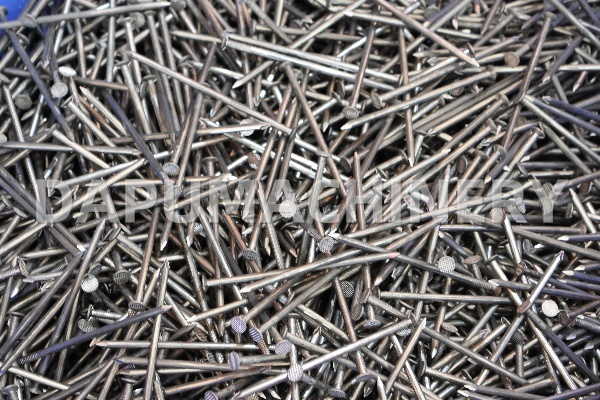
How Does a Nail Making Machine Work? Full Guide for Beginners
Category:News
Author:
Source:
Add time:2025-05-07 11:51
If you’re new to the manufacturing or construction industry, you might wonder how nails—those small but essential fasteners—are made efficiently. A nail making machine automates this process, turning raw materials into finished nails at high speeds. For markets like South America, the Middle East, Southeast Asia, and Africa, where construction and infrastructure development are booming, understanding how these machines work—and choosing the right one—can make or break a business.


In this guide, we’ll break down the basics of nail making machines, address key pain points for users in emerging markets, and showcase how the DAPU Nail Making Machine (model: DAPU Automatic Nail Making Machine) solves these challenges.
How Does a Nail Making Machine Work?
A nail making machine transforms steel wire into nails through a series of automated steps. Here’s a simplified breakdown:
Feeding the Wire
A coil of steel wire is loaded into the machine. The wire is straightened and fed into the system at a controlled speed.
Cutting to Length
The wire is cut into precise lengths based on the nail size required (e.g., 1 inch, 2 inches).
Forming the Head
One end of the cut wire is hammered or pressed to create the nail head.
Sharpening the Tip
The opposite end is ground or punched to form a sharp point.
Finishing
Optional steps include polishing, galvanizing, or coating the nails for corrosion resistance.
The entire process is automated, allowing a single machine to produce thousands of nails per hour.
Key Pain Points in Emerging Markets
For businesses in regions like South America, the Middle East, Southeast Asia, and Africa, investing in a nail making machine involves unique challenges. Let’s explore these pain points and how they impact operations:
1. Power Supply Instability
Many areas face inconsistent electricity or low voltage. Machines that require high, stable power inputs may stall or damage easily, leading to downtime and lost revenue.
Solution: Machines with low power consumption and compatibility with generators or solar power are critical.
2. Limited Technical Expertise
Skilled operators are scarce in remote or developing regions. Complex machines with steep learning curves can slow production and increase labor costs.
Solution: Equipment with user-friendly controls, minimal maintenance, and clear training guides.
3. Harsh Environmental Conditions
Dust, humidity, and extreme temperatures in regions like the Middle East or Africa can wear down machinery faster.
Solution: Machines built with durable materials and protective coatings to resist rust and corrosion.
4. Cost-Effectiveness
Startups and small businesses need affordable machines that deliver quick returns without compromising quality.
Solution: Budget-friendly models with high production efficiency and low maintenance costs.
5. Material Flexibility
Access to raw materials varies. Some regions rely on recycled steel or non-standard wire sizes.
Solution: Machines that accept multiple wire diameters (e.g., 1.2mm–5.0mm) and adapt to material inconsistencies.
Why the DAPU Nail Making Machine Stands Out
The DAPU Automatic Nail Making Machine is engineered to address the above challenges head-on. Here’s how it caters to global markets:
Product Overview
This machine specializes in producing common nails, roofing nails, and concrete nails in sizes ranging from 10mm to 150mm. Its modular design allows easy customization for specific market needs.
Key Features
Low Power Consumption: Runs on 3-phase 380V power but adapts well to unstable grids.
User-Friendly Operation: Simple touchscreen controls and automatic error detection.
Durable Construction: Reinforced steel frame and anti-rust components for harsh climates.
Material Flexibility: Works with wire diameters from 1.2mm to 5.0mm (including recycled materials).
High Output: Produces 200–400 nails per minute, depending on size.
Technical Parameters
Power: 7.5 kW
Dimensions: 1500mm x 900mm x 1500mm
Weight: 1500 kg
Nail Length Range: 10mm–150mm
Wire Compatibility: Low-carbon steel, iron, copper
Applications in Target Markets
Let’s see how the DAPU machine solves real-world problems:
South America: Small construction firms use it to produce affordable nails for housing projects, reducing reliance on expensive imports.
Middle East: Manufacturers in hot, dusty environments benefit from its corrosion-resistant parts and low downtime.
Africa: Solar-powered setups enable off-grid workshops to thrive in rural areas.
Southeast Asia: Recycled steel compatibility cuts material costs for startups.
Maintenance Tips for Longevity
To maximize your machine’s lifespan:
Lubricate moving parts weekly.
Clean debris after each shift.
Use high-quality wire to reduce wear.
Schedule annual professional inspections.
Conclusion
A nail making machine is a game-changer for businesses in fast-growing markets. By addressing critical pain points—power issues, ease of use, durability, and cost—the DAPU Automatic Nail Making Machine offers a reliable, efficient solution. Whether you’re in Lima, Lagos, or Jakarta, this machine empowers you to meet local demand while keeping costs low.
For beginners, starting with a robust, adaptable machine like DAPU’s ensures a smoother journey into nail production. Ready to take the next step? Visit DAPU Machinery to explore their full range of equipment and technical support options.
Recommend News




